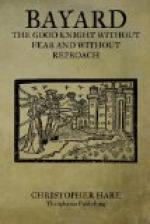When young Bayard heard that the King was to see him he was as much delighted as if he had won the city of Lyons; and he went in haste to the head groom of the Duke of Savoy and prayed him to get his horse ready for him, offering his short dagger as a present. But this the man refused and made reply: “Go and comb and clean yourself, my friend, and put on your best clothes, and if, by God’s help, the King of France takes you in favour, you may some day become a great lord and be able to serve me.” “Upon my faith! You may trust me never to forget all the kindness you have shown me,” replied the boy; “and if God ever gives me good fortune you shall share it.” It seemed a long time to his impatience before the hour arrived when he rode his horse, attended by his equerry, to the meadow where he was to await the King and his company, who arrived by boat on the Saone. As soon as Charles VIII. had landed he cried: “Page, my friend, touch up your horse with your spurs!” which the lad did at once, and to see him you would have thought that he had been doing it all his life. At the end of his race Bayard made his clever horse take a few jumps, and then he rode straight towards the King and gracefully drew up before him with a low bow. All the company was delighted with the performance, and the King bade him do it again. “Picquez! Picquez!” (Prick up your horse!), he cried, and all the pages shouted: “Picquez! Picquez!” with enthusiasm, so that for some time the name stuck to him.
Then Charles turned to the Duke of Savoy and said: “I see that my cousin of Ligny told me the truth at dinner, and now I will not wait for you to give me this page and his horse, but I demand it of you as a favour.”
“Most willingly, my lord,” answered the Duke, “and may God give him grace to do you true service.” After this young Bayard was given into the special charge of the lord of Ligny, who was greatly pleased and felt sure that he would make of him a noble knight.
Meantime, the Duke of Savoy remained for awhile at the Court of Charles VIII., with whom he was in great favour, and they were like brothers together. This young King was one of the best of princes, courteous, generous, and beloved of all men. At length the day of departure came, and the good Duke went back to his own country, laden with beautiful and honourable presents.




